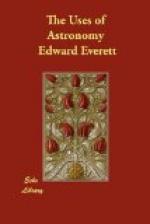I happened on one occasion to be in company with this highly distinguished man of science, whose social qualities are as pleasing as his constructive talent is marvelous, when another eminent savant, Count Strzelecki, just returned from his Oriental and Australian tour, observed that he found among the Chinese, a great desire to know something more of Mr. Babbage’s calculating machine, and especially whether, like their own swampan, it could be made to go into the pocket. Mr. Babbage good-humouredly observed that, thus far, he had been very much out of pocket with it.
INCREASED COMMAND OF INSTRUMENTAL POWER.
Whatever advances may be made in astronomical science, theoretical or applied, I am strongly inclined to think that they will be made in connection with an increased command of instrumental power. The natural order in which the human mind proceeds in the acquisition of astronomical knowledge is minute and accurate observation of the phenomena of the heavens, the skillful discussion and analysis of these observations, and sound philosophy in generalizing the results.
In pursuing this course, however, a difficulty presented itself, which for ages proved insuperable—and which to the same extent has existed in no other science, viz.: that all the leading phenomena are in their appearance delusive. It is indeed true that in all sciences superficial observation can only lead, except by chance, to superficial knowledge; but I know of no branch in which, to the same degree as in astronomy, the great leading phenomena are the reverse of true; while they yet appeal so strongly to the senses, that men who could foretell eclipses, and who discovered the precession of the equinoxes, still believed that the earth was at rest in the center of the universe, and that all the host of heaven performed a daily revolution about it as a center.
It usually happens in scientific progress, that when a great fact is at length discovered, it approves itself at once to all competent judges. It furnishes a solution to so many problems, and harmonizes with so many other facts,—that all the other data as it were crystallize at once about it. In modern times, we have often witnessed such an impatience, so to say, of great truths, to be discovered, that it has frequently happened that they have been found out simultaneously by more than one individual; and a disputed question of priority is an event of very common occurrence. Not so with the true theory of the heavens. So complete is the deception practiced on the senses, that it failed more than once to yield to the suggestion of the truth; and it was only when the visual organs were armed with an almost preternatural instrumental power, that the great fact found admission to the human mind.
THE COPERNICAN SYSTEM.




